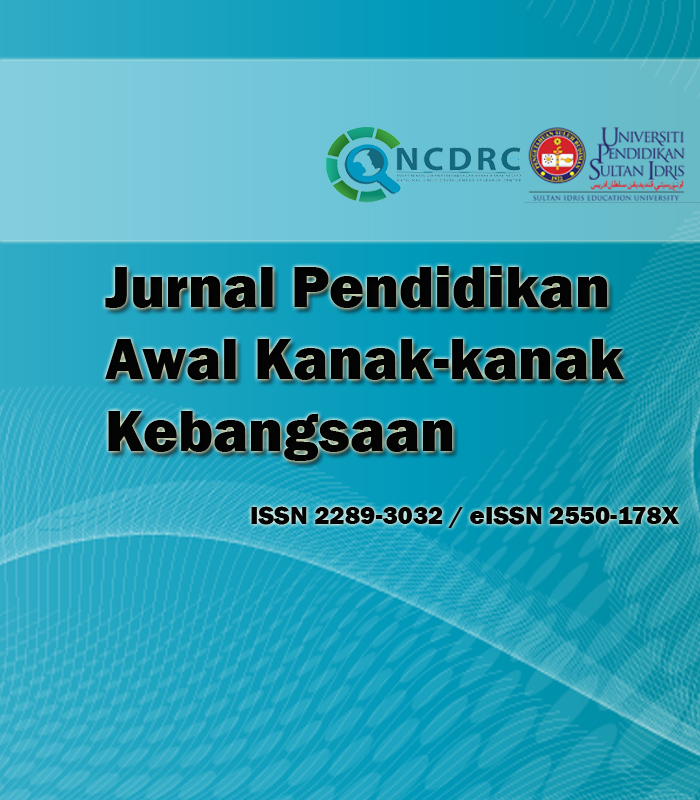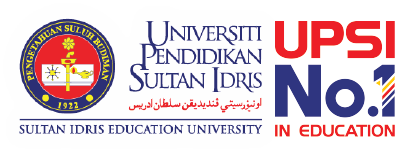Post Pandemic COVID-19: Kindergarten Teachers’ Perceptions Toward the Number Concept Skills of 5 Year Old Children
DOI:
https://doi.org/10.37134/jpak.vol13.1.4.2024Keywords:
COVID-19, number concept, mathematics, knowledge level, teaching methodAbstract
This study aims to examine the perception of kindergarten teachers towards the two objectives of the study, which are to see the level of kindergarten teachers' knowledge of the importance of number concepts and to identify suitable teaching methods to be applied after the COVID-19 pandemic. A quantitative approach with a survey research design was used in this study. The selection of the study sample was carried out by sampling in order to involve 108 samples of kindergarten teachers who are in the field of early childhood education in the government or private sector. The research instrument used is a questionnaire. Data were analyzed using descriptive analysis using the Statistical Package for Social Sciences (SPSS) version 29.0 software. The findings of the study show that there is a direct relationship between the level of teachers' knowledge of the concept of numbers with appropriate teaching methods to be applied after the COVID-19 pandemic. This is because the study sample knows the appropriate teaching methods to be applied in learning number concepts. The implications of this study are expected to further increase the level of knowledge of kindergarten teachers regarding the importance of number concepts and this study was carried out to find a more appropriate teaching method to help improve mathematical number concept skills among 5-year-old children in the classroom. So, the COVID-19 pandemic is seen to some extent to have had a big impact on number concept skills among 5-year-old children which is at a worrying level.
Downloads
References
Aziz, A. R. A. (2020). Pengangguran dalam kalangan tenaga kerja semasa wabak Covid-19. Malaysian Journal of Social Sciences and Humanities (MJSSH), 5(11), 1-9.
Bahagian Pendidikan Guru. (2009). Standard Guru Malaysia. Putrajaya.
Connie Shin dan Juppri Bacotang. (2019). Kesan Kaedah Mengajar Terhadap Pencapaian Awal Matematik dalam Kalangan Kanak-kanak Prasekolah. Jurnal Pendidikan Kanak-kanak Kebangsaan, Vol.8, 8-16.
Cucinotta, D dan Vanelli. (2020). WHO declares Covid 19 a Pandemic. Acta Biomed. 91(1), 157-160.
Dewisusanti Anak Jole dan Kamariah Abu Bakar. (2022). The Using of ‘Caps Kit’to Recognize Number 1 to 10 Among Preschool Children: Penggunaan ‘Caps Kit’untuk mengenal nombor 1 hingga 10 di kalangan Kanak-kanak Prasekolah. Jurnal Pendidikan Awal Kanak-Kanak Kebangsaan, 11, 35-41.
Hazhari Ismail. (2021). COVID-19 antara punca utama kemahiran 3M murid terjejas, Berita Harian. https://www.bharian.com.my/berita/pendidikan/2021/03/794037/covid-19-antara-punca-utama-kemahiran-3m-murid-terjejas
Indah Miftahusolihah Marhaban dan Abdul Halim MAsnan. (2020). Keberkesanan alat inovasi 2C (Clip & Count) dalam aktiviti operasi tambah terhadap kanak-kanak tadika: The effectiveness of 2C (Clip & Count) innovation tools in addition operations activities for kindergarten children. Jurnal Pendidikan Awal Kanak-Kanak Kebangsaan, 9, 127–142. Retrieved from https://ojs.upsi.edu.my/index.php/JPAK/article/view/4547
Intan Safinas Mohd Ariff Albakri, Fazilah Idris, Maznah Ibrahium dan Alawiah Ibrahim. (2001). Kaedah pengajaran berkesan: Antara keperluan pelajar dan realiti pengajaran pengajian jarak jauh. Jurnal Pengajian Umum Asia Tenggara, 2, 81-95.
Jinyoung, K. (2020). Learning and Teaching Online During Covid-19: Experiences of Student Teachers in an Early Childhood Education Practicum. International Journal of Early Childhood, 145-158.
Jole, D., & Abu Bakar, K. (2022). The Using of ‘Caps Kit’ to Recognize Number 1 to 10 Among Preschool Children.Jurnal Pendidikan Awal Kanak-Kanak Kebangsaan,11, 35-41. https://doi.org/10.37134/jpak.vol11.sp.4.2022
Kementerian Pendidikan Malaysia. (2017). Kurikulum Standard Prasekolah Kebangsaan 2017. Malaysia: Bahagian Pembangunan Kurikulum, Kementerian Pelajaran Malaysia.
Krejcie, R. V., & Morgan, D. W. (1970). Determining sample size for research activities. Educational and psychological measurement, 30(3), 607-610.
Lee, M. C., dan Kamariah Abu Bakar. (2022). Effective use of Multisensory Approach in Improving Number Concept Skills Among Pre-Schoolers. Jurnal Pendidikan Bitara UPSI, 15, 53-61. https://doi.org/10.37134/bitara.vol15.sp.6.2022
Mohamad Najib Abdul Ghafar (1999). Penyelidikan Pendidikan. Skudai: Penerbitan Universiti Teknologi Malaysia
Mohd Najib, A. G. (2003). Reka bentuk tinjauan soal selidik pendidikan. Skudai: Universiti Teknologi Malaysia.
Mohd. Majid Konting (2004). Kaedah Penyelidikan Pendidikan. Kuala Lumpur : Dewan Bahasa Dan Pustaka.
Ompok, C. C. (2021). Penggunaan Kaedah Permainan, Buku Nombor dan Lembaran Kerja dalam Pembelajaran Matematik Awal Kanak-kanak. Malaysian Journal of Social Sciences and Humanities (MJSSH), 6(10), 235 - 251. https://doi.org/10.47405/mjssh.v6i10.1117
Pallant, J. (2010). SPSS survival manual -a step bystep guide to data analysis using SPSS for windows (version 10). Buckingham Open University Press.
Piaget, J. (1970). Piaget’s Theory in P.H.Mussed (ED) carmichael’s manual of child psychology (3rd ed.). New York: Wiley.
Siti Shahida Rashdi, Abdul Halim Masnan dan Mahizer Hamzah. (2021). Pembangunan dan kebolehgunaan modul pengajaran berasaskan game board dalam pembelajaran operasi nombor kanak-kanak prasekolah Jurnal Pendidikan Awal Kanak-Kanak Kebangsaan,10(2), 71-84. https://doi.org/10.37134/jpak.vol10.2.7.2021
Vygotsky, L. (1978). Mind in society: The development of higher psychological processes. Cambridge, MA: Harvard University Press.
Downloads
Published
How to Cite
Issue
Section
License
Copyright (c) 2024 Norhanisah Othman, Muhammad Fatkhurrozak Sokhipul Hadi

This work is licensed under a Creative Commons Attribution-NonCommercial-ShareAlike 4.0 International License.





